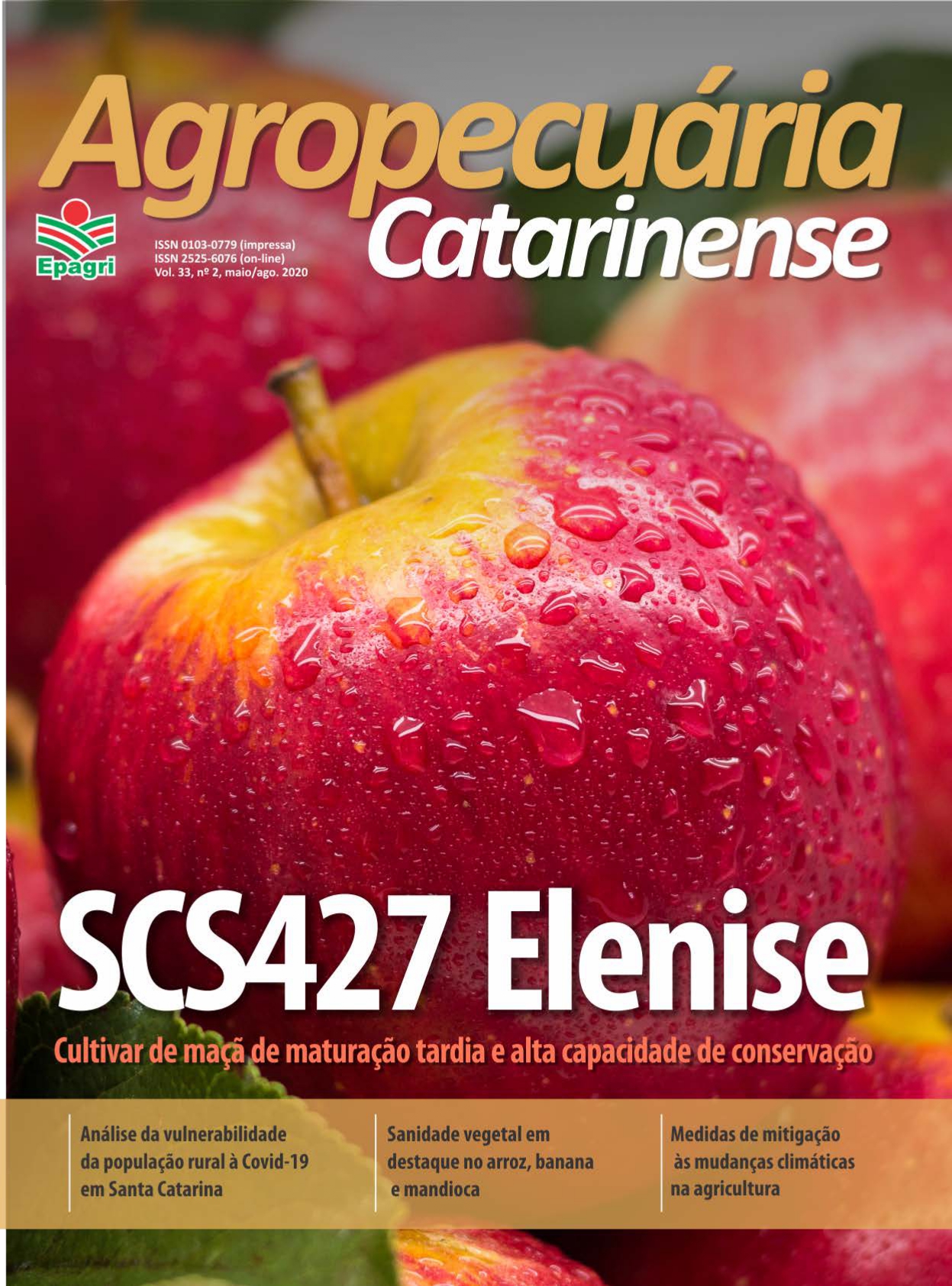Grain yield and quality of irrigated rice in seasons with different thermal regimes at flowering
DOI:
https://doi.org/10.52945/rac.v33i2.793Keywords:
Oryza sativa, Heat, Sterility, Grain quality.Abstract
Temperature is one of the most important climatic factors for rice production. Temperatures above 35ºC limit the production of this cereal, damaging irreversibly its yield. Anthesis is the most sensitive phase of rice to the occurrence of high temperatures. This experiment was carried out aiming to evaluate the agronomic performance and grain quality of five rice genotypes (Epagri 109, SCS116 Satoru, SCS121 CL, SCS122 Miura and SC 676) at two growing seasons (2016/17 and 2017/18), correlating them with the air temperature during anthesis and grain filling. The following variables were assessed: spikelet sterility, yield, mass of 1,000 grains and postharvest qualitative aspects (milling yield and chalky grain percentage). The temperatures recorded in the 2016/17 growing season from anthesis to harvest were higher than in 2017/18. They present averages of 30.5 and 28.5ºC and maximum temperatures of 34.3 and 30.9ºC for each experimental year, respectively. The higher temperatures of the first growing season reduced grain yield, 1,000 grain mass and milling yield. They also increased spikelet sterility and chalky grains. The inbreed line SC 676 presented the highest yield (13,070kg ha-1), however, it was also the genotype with worst grain quality.Metrics
References
ALI, F.; WATERS, D. L. E.; OVENDEN, B.; BUNDOCK, P.; RAYMOND, C. A.; ROSE, T. J. Heat stress during grain fill reduces head rice yield through genotype dependant increased husk biomass and grain breakage. Journal of Cereal Science, London, v.90, p.1-7, 2019. DOI: 10.1016/j.jcs.2019.102820
BECKLES, D. M.; THITISAKSAKUL, M. How environmental stress affects starch composition and functionality in cereal endosperm. Starch Journal, Weinheim, v.65, p.1-14, 2013. DOI: 10.1002/star.201300212
CHEN, J.; YAN, H.; MU, Q.; TIAN, X. Impacts of prolonged high temperature on heavy-panicle rice varieties in the field. Chilean Journal of Agricultural Research, Chillán, v.77, n.2, p.102-109, 2017. DOI: 10.4067/S0718-58392017000200102
COUNCE, P. A.; KEISLING, T. C.; MITCHELL, A. J. A uniform, objective, and adaptive system for expressing rice development. Crop Science, Madison, v.40, n.4, p.436-443, 2000. DOI: n/d
EBERHARDT, D. S. Altas temperaturas afetam produtividade e qualidade do arroz irrigado no estado. Revista Agropecuária Catarinense, Florianópolis, v.23, n.2, p.12, 2010. DOI: n/d
EPAGRI – Empresa de Pesquisa Agropecuária e Extensão Rural de Santa Catarina. Publicações. Florianópolis, SC, 2020. Disponível em <https://www.epagri.sc.gov.br/ index.php/solucoes/publicacoes/folder-tecnico/> Acesso em: 02 jan. 2019.
INMET – Instituto Nacional de Meteorologia. Estações Automáticas. Brasília, DF, 2019. Disponível em <http://www.inmet.gov.br/portal/index.php?r=estacoes/estacoes Automaticas> Acesso em: 02 jan. 2019.
JAGADISH, S. V. K.; CRAUFURD, P. Q.; WHEELER, T. R. Phenotyping parents of mapping populations of rice for heat tolerance during anthesis. Crop Science, Madison, v.48, p.1140-1146, 2008. DOI: 10.2135/cropsci2007.10.0559
LONDERO, G. P.; MARCHESAN, E.; PARISOTTO, E.; COELHO, L. L.; ARAMBURU, B. B.; FLORES, C. S.; SILVA, A. L. Qualidade industrial de grãos de arroz decorrente da supressão da irrigação e umidade de colheita. Irriga, Botucatu, v.20, n.3, p.587-601, 2015. DOI: n/d
LYMAN, N. B.; JAGADISH, K. S. V.; NALLEY, L. L.; DIXON, B. L.; SIEBENMORGEN, T. Neglecting rice milling yield and quality underestimates economic losses from high-temperatures stress. Plos One, San Francisco, v.8, n.8, p.1-9, 2013. DOI: 10.1371/journal.pone.0072157
MARSCHALEK, R.; ROZZETTO, D. S.; ANDRADE, A.; WICKERT, E. Avaliação de genótipos de arroz irrigado em região de elevada altitude, sujeitos a baixas temperaturas 2013/14 - 2014/15. In: CONGRESSO BRASILEIRO DE ARROZ IRRIGADO, 9., 2015. Pelotas. Anais[...] Pelotas, 2015. p.116-119.
MARSCHALEK, R; SOUZA, N. M.; WICKERT, E.; ANDRADE, A.; TERRES, L. R.; MASSIGNAM, A. M.; RICCE, W. S.; SANGOI, L. Produtividade de cultivares e linhagens de arroz irrigado em região de altitude, sujeita a baixas temperaturas, safras 2017/18 e 2018/19. In: CONGRESSO BRASILEIRO DE ARROZ IRRIGADO, 11., 2019. Balneário Camboriú. Anais[...] Balneário Camboriú, 2019. p.129-132.
NGUYEN, D. N.; LEE, K. J.; KIM, D. I.; ANH, N. T.; LEE, B. W. Modeling and validation of high-temperature induced spikelet sterility in rice. Field Crops Research, Stockholm, v.156, p.293-302, 2014. DOI: 10.1016/j.fcr.2013.11.009
SHRIVASTAVA, P.; SAXENA, R. R.; XALXO, M. S.; VERULKAR, S. B. Effect of high temperature at different growth stages on rice yield and grain quality traits. Journal of Rice Research, Rajendra Nagar, v.5, n.1 e 2, p.29-42, 2012. DOI: n/d
SILVA, F. A. S.; AZEVEDO, C. A. V. The Assistat Software Version 7.7 and its use in the analysis of experimental data. African Journal of Agricultural Research, Lagos, v.11, n.39, p.3733-3740, 2016. DOI: n/d
SOCIEDADE SUL-BRASILEIRA DE ARROZ IRRIGADO (SOSBAI). Arroz irrigado: Recomendações técnicas da pesquisa para o sul do Brasil. Pelotas, RS: SOSBAI. 2016. 200p.
SOUZA, N. M. Tolerância a baixas temperaturas na fase de microsporogênese em genótipos de arroz irrigado. 2015. 93 p. Dissertação (Mestrado em Produção Vegetal) - Universidade do Estado de Santa Catarina, Centro de Ciências Agroveterinárias, SC, 2015.
SOUZA, N. M.; MARSCHALEK, R.; SANGOI, L.; WEBER, F. S. Spikelet sterility in rice genotypes affected by temperature at microsporogenesis. Revista Brasileira de Engenharia Agrícola e Ambiental, Campina Grande, v.21, n.12, p.817-821, 2017. DOI: 10.1590/1807-1929/agriambi.v21n12p817-821
SREENIVASULU, N.; BUTARDO JUNIOR, V. M.; MISRA, G.; CUEVAS, R. P.; ANACLETO, R.; KISHOR, P. B. K. Designing climate-resilient rice with ideal grain quality suited for high-temperature stress. Journal of Experimental Botany, Oxford, v.66, n.7, p.1737-1748, 2015. DOI: 10.1093/jxb/eru544
VAN OORT, P. A. J.; SAITO, K.; ZWART, S. J.; SHRESTHA, S. A simple model for simulating heat induced sterility in rice as a function of flowering time and transpirational cooling. Field Crops Research, Stockholm, v.156, p.303-312, 2014. DOI: 10.1016/j.fcr.2013.11.007
ZHAO, X.; FITZGERALD, M. Climate change: implications for the yield of edible rice. Plos One, San Francisco, v.8, n.6, p.1-9, 2013. DOI: 10.1371/journal.pone.0066218
Downloads
Published
How to Cite
Issue
Section
License
Copyright (c) 2020 Authors

This work is licensed under a Creative Commons Attribution 4.0 International License.




